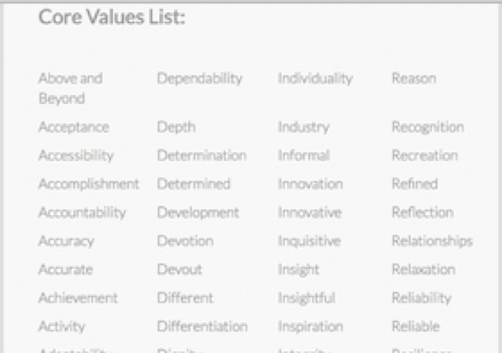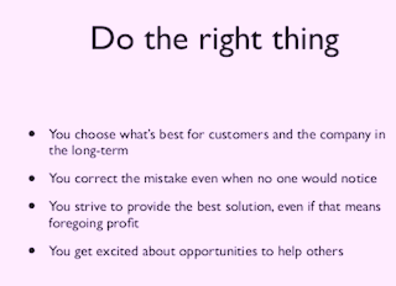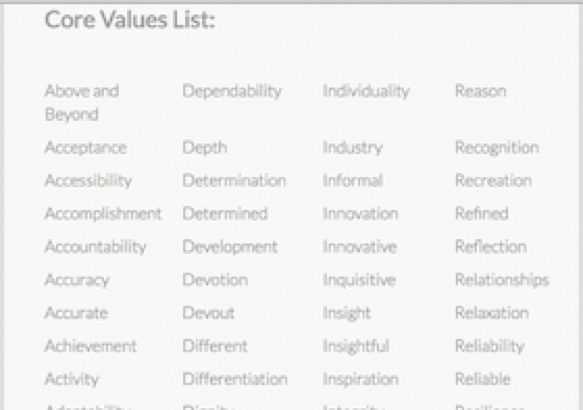
If you look at Glassdoor, a site where employees rate their company, culture comes up a lot.
What people are generally referring to is often environment (fun and friendly). Or maybe structure (flexible or telecommuting). Or possibly perks (free coffee and snacks). While all of these play a role in the overall culture, the key influence is found in the company values.For a company to live these values requires people who know what they are, truly believe in them and can find their own ways to manifest them daily. Identifying them is a purposeful action, not an accident. It’s the key way you can be sure that the things you want your customers to know and feel are communicated by everyone.
When properly examined and articulated, values become the ultimate hiring guide. Hiring without this direction is a hit and miss effort. And an expensive one.
Having well articulated values with examples of the behaviors and traits that bring them to life is the foundation of a successful recruitment strategy. Here's where you can start:
1. Discover what the company believes and stands for.
This is a major strategic initiative that every successful company has to undertake. Believe it or not, there are sites that will give you an idea of values. I actually know companies that circle five or six of these adjectives, call them their values and go from there.

To find truly differentiating and deliverable traits and insights, look internally. Employees know a lot. Take advantage of their input. Just asking “what’s our culture” will likely result in unimaginative replies.
Here are some exercises that will help you access internal knowledge to develop and/or validate your strategy.
Everyone answers these questions:
-
What will our company always do? What will we never do?
-
What should we do more of? What should we do less of?
-
What’s the biggest lie we tell ourselves?
-
Write 5 adjectives that describe your day. (See what words repeat, and that gives a good snapshot of the morale and “vibe”) .
Properly interpreted, this input will be a treasure trove of great insights.
2. List your core principles.
Why does the company exist? What is the company purpose? What can people count on you to always do? Or never do.
If you do the exercises above, they will answer these questions. The thing about core values is that they are “core.” People or even products might change within a company, but the values should still apply. Unless you’re a startup, don’t ignore employee input.
RELATED: Community First, Profit Second: Rethinking the Corporate Model So Everyone Wins
3. Determine the traits and actions that enable each value.
This is the most overlooked step. It’s what makes the values actionable. It’s what makes it possible to hire the exact perfect fit for your team. Buffer does an excellent job of giving examples of how to live and deliver each value. Here’s just one of their ten values with some possible ways to live it.
 Once you do this for each value, you’ll have the guide for your recruitment process.
Once you do this for each value, you’ll have the guide for your recruitment process.
4. Develop the perfect interview.
Now that the traits that support the values are codified, you’ll know precisely what you’re looking for and how to identify it. The interview can focus on those behaviors. For example, the “do the right thing” value with behaviors shown above could lead to questions like: Have you ever come up with a great solution that wasn't profit motivated? What’s an example of how you helped a colleague? Have you ever corrected a mistake even if no one would notice?
Now HR has a map for finding the right team member.
ALSO READ: What a Radical Japanese Tech Company Can Teach Us About Retaining Happy Employees
Some companies have a “would we want to have a beer with this person” attitude when it comes to hiring and culture. That could backfire! Hiring based on social habits and compatibility results in the opposite of diversity. You don’t want a company of clones. You want a passionate group excited by what the company does.
Hire for alignment and commitment, not style. How people function is not as important as what they believe in. People get to places in different ways. How they get there isn’t as important as their commitment to the journey.
5. Examine your recruitment process.
Consider your entire process in terms of how it illustrates and supports the values. Is the tone of the job description reflective of the traits valued? Does it talk about culture in terms of strategy rather than ping pong? Is the process itself in sync with the values? For example, if one of your values is speed and agility, your recruitment effort shouldn’t have five parts and take a month. Connect all the dots.
6. Tell your story constantly, consistently and everywhere.
Every piece potential recruits will see should reflect the story that the values tell. Dignity Health does a tremendous job which is detailed here. Once you’ve done the thinking that leads to the right foundation, your employer brand will genuinely take shape.
Getting to the heart of your company culture is an intense, introspective deep dive into the truth of the organization . But it will make it possible to attract and identify people who naturally reflect your company values. It’s worth the effort and will pay off daily forever.
NEXT: Read More Stories and Best Practices on Company Culture from Kintone
About the Author
Jann is a brand strategist and storyteller. She has a unique process to help companies determine their unique advantages and tell the stories that support them.











